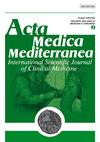Phacoemulsification Results of Eyes with Primary Angle Closure and Primary Angle Closure Glaucoma Using the Pentacam System
IF 0.3
4区 医学
Q4 Medicine
引用次数: 0
Abstract
Aim: To evaluate the phacoemulsification results of patients with primary angle closure (PAC) and primary angle closure glaucoma (PACG) using the Pentacam system. Method: This retrospective cohort study included patients with PAC and PACG who underwent phacoemulsification and intraocular lens implantation between 2018 and 2021 in one tertiary center. Anterior chamber parameters measured using the Pentacam system and gonioscopic and intraocular pressure (IOP) changes were evaluated preoperatively and postoperatively. Results: Nineteen eyes of 13 patients with PAC and PACG were included in the study. The mean age of the patients was 63.2 years, and 30.8% were male. The mean preoperative and postoperative third-month IOP was 21.0 ± 7.4 mmHg (11-40) and 13.7± 2.5 mmHg (9-18), respectively (p < 0.01). The mean preoperative anterior chamber angle (ACA) measured by the Pentacam system was 21.07 ± 4.16° (13-27). The mean preoperative anterior chamber depth (ACD) and the anterior chamber volume (ACV) measured by the Pentacam system were 1.79 ± 0.24 mm (1.39-2.22) and 72.55 ± 20.64 mm3 (45-109), respectively. The postoperative third-month topographic measurements were as follows: mean angle, 35.76 ± 7.32° (20.1-46.9); mean ACD, 3.52 ± 0.95 mm (1.15-4.46); and mean ACV, 133.21 ± 25.21 mm3 (81-173) (p < 0.01). Conclusion: Pentacam is a useful system to evaluate anterior segment changes after phacoemulsification in patients with PAC and PACG. Phacoemulsification was found to result in significant IOP reduction in these patients.原发性闭角型和原发性闭角型青光眼的超声乳化术效果
目的:评价Pentacam系统对原发性闭角型青光眼(PAC)和原发性闭角型青光眼(PACG)的超声乳化效果。方法:回顾性队列研究纳入2018年至2021年在同一三级中心行超声乳化术和人工晶状体植入术的PAC和PACG患者。术前和术后分别用Pentacam系统测量前房参数,并进行角镜检查和眼内压(IOP)变化评估。结果:13例PAC和PACG患者共19只眼纳入研究。患者平均年龄63.2岁,男性占30.8%。术前、术后3个月平均IOP分别为21.0±7.4 mmHg(11-40)、13.7±2.5 mmHg(9-18),差异有统计学意义(p < 0.01)。Pentacam系统测量的术前平均前房角(ACA)为21.07±4.16°(13-27)。Pentacam系统测得的术前平均前房深度(ACD)和容积(ACV)分别为1.79±0.24 mm(1.39 ~ 2.22)和72.55±20.64 mm3(45 ~ 109)。术后第3个月的地形测量如下:平均角度35.76±7.32°(20.1-46.9);平均ACD, 3.52±0.95 mm (1.15 ~ 4.46);平均ACV为133.21±25.21 mm3 (81 ~ 173) (p < 0.01)。结论:Pentacam是评价PAC和PACG患者超声乳化术后前段改变的有效系统。发现超声乳化术可显著降低这些患者的IOP。
本文章由计算机程序翻译,如有差异,请以英文原文为准。
求助全文
约1分钟内获得全文
求助全文
来源期刊

Acta Medica Mediterranea
医学-医学:内科
自引率
0.00%
发文量
0
审稿时长
6-12 weeks
期刊介绍:
Acta Medica Mediterranea is an indipendent, international, English-language, peer-reviewed journal, online and open-access, designed for internists and phisicians.
The journal publishes a variety of manuscript types, including review articles, original research, case reports and letters to the editor.
 求助内容:
求助内容: 应助结果提醒方式:
应助结果提醒方式:


